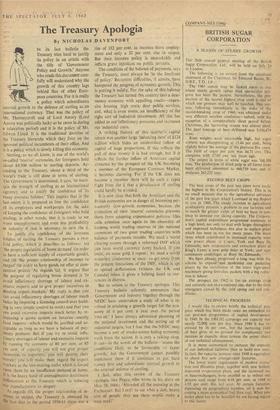The Treasury Apologia
By NICHOLAS DAVENPORT Sterling, as we all know, is one of the world's so-called 'reserve' currencies, for foreigners hold about £4,300 million in sterling deposits. Ac- cording to the Treasury, about a third of the world's trade is still done in terms of sterling. -fle Government is determined, it says, `to main- tain the strength of sterling as an international currency and to justify the confidence of its many overseas holders.' This implies that in the last :resort it is prepared to lose the confidence of its employers and workpeople for the sake of keeping the confidence of foreigners who hold sterling; in other words, that it is ready to see more unemployment and even less profitability in industry if that is necessary to saVe the £.
To justify 1.-the confidence of the :overseas holders of sterling the Treasury pursues a two- fold policy, which it describes as follows: (a) the proper regulation of home demand' (in order to have a sufficient supply of exportable goods), and (b) the proper relationship of incomes to outpUt'(in order to have goods on offer at com- petitive prices). 'As regards '(a), it argues that the purpose of regulating home demand is `to avoid inflationary shortage of labour and ex- cessive imports and to give proper incentives to develop export markets.' My reply is that you can avoid inflationary shOrtages of labour much better by imposing a licensing control over build- ing (a very simple control to work) and that you can avoid excessive imports much better by re- imposing a quota system on luxuries—mainly food imports--which would be justified and ac- ceptable as long as we have a balance of pay- Ments problem. But if you try to avoid infla- tionary shortages of labour and excessive imports by running the economy at 80 per cent. or 85 Per cent. of capacity you will not give proper incentives to exporters; you will destroy their ITh:)rale; you will make them regard the export n'iarkets as the loss-making outlet which is forced upon them by an insufficient demand at home.
is the heavy hand of unimaginative doctrinaire deflationism at the Treasury which is reducing °Ur manufacturers to despair.
As regards (b), the proper relationship of in- comes to output, the Treasury is obsessed by the fact that in the period 1950-61 there was a rise of 112 per: cent. in incomes from employ- ment and only a 32 per cent. rise in output. But their incomes policy is unworkable and inflicts grave injustices on public servants.
The condition of the balance of payments, says the Treasury, must always be 'in, the forefront of policy.' Recurrent difficulties, it admits, have hampered the progress of economic growth. This is putting it mildly. For the sake of this balange the Treasury has turned this country into a dear- money economy with appalling results—expen- sive housing, high rents, dear public services, and, what is even worse, an insufficiency of the right sort of industrial investment. All this 'has added to our inflationary pressures and increased our industrial costs.
A striking feature of this quarter's capital return was another large 'balancing item' of £124 million which hides an unidentified inflow of capital of huge proportions. If this reflects the pull ,of dear money it is bad enough, but if it reflects the further inflow of Arnerican capital attracted by- the prospect of the UK becoMing a meniber of the European Common Market, it becomes alarming. For if the UK does not become a member there will be such a rapid fight from the £ that a .devaluation of sterling could hardly be avoided.
It is now clear that both the American and the British economies are in danger of becoming per- manently slow-growth economies, because the protection of their 'reserve'. currencies prevents them. from adopting expansionist policies. This
- calls attention once again to the absurdity of keeping world trading reserves in the' national currencies of two great trading* countries 'with balance of payments trouble.' We need a world- clearing system throUgh a reformed IMF which cats issue world currency notes backed, if you insist,' on some gold. I repeat: we need a world monetary conference at once-'-to get away from the present limitations of the IMF, which is a.pt to spread deflationism (witness the UK and Canada) when it gives a helping hand to cur- rencies in distress.
But to return to the Treasury apologia. This Treasury bulletin solemnly announces that 'Government and industry together through the NEDC have undertaken a study of what is in- volved in attaining a growth target for the eco- nomy of 4 per cent. a year over the period 1961-66.' 1 have always advocated planning of the national investment and the setting up of industrial targets, but I fear that the NEDC may become a sort of smoke-screen hiding economic truth from the nation. It is only a talking shop. It can—in the words of the bulletin—'assess the conditions likely to be favourable to faster growth,' but the Government cannot possibly implement them if it continues to put hard n:oney first and subordinate internal growth to the external defence of sterling.
I feel, after this review of the Treasury apologia, like Pepys,, who wrote in his diary an
May 18, 1666: 'Attended all the morning at the Exchequer. But Lord! to see what a dull, heavy sort of people they are there would make a man mad!'










































 Previous page
Previous page